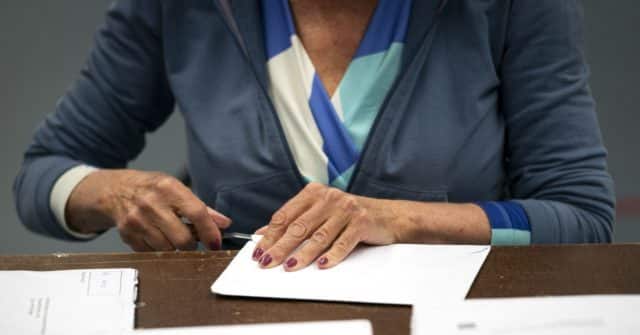The Netherlands has changed its postal voting system mid-election, which could result in thousands of votes previously considered invalid to be counted.
Dutch Interior Minister Kajsa Ollongren announced the changes this week after it emerged that as many as five to ten per cent of the postal votes cast appeared to have errors making them invalid. In previous elections, the total number of rejected votes is usually around 0.3 per cent.
Algemeen Dagblad explained that postal voters were given two envelopes: a voting envelope and a return envelope. Voters were instructed to put their ballot in the voting envelope, and then their voting pass and the voting envelope in the return envelope for mailing. This method keeps the ballot secret by allowing staff to validate the vote as legitimate without actually seeing which candidate the voter selected.
The Dutch newspaper said the invalid ballots were generally a result of people mistakenly putting their voting pass in the voting envelope with the ballot, rather than separately within the return envelope. The paper also claims that most postal voters are over the age of 70.
Under the new rules, polling station workers will be able to open the envelopes containing the ballot papers to retrieve the voting pass, a practice that was not allowed previously due to concerns over vote secrecy.
Ollongren said that voter secrecy concerns were not an issue and that the folded ballot paper would not be looked at or unfolded by the polling staff.
With Socially Distanced Polling Stations, Netherlands Votes for Next Government https://t.co/v00y6Ylcis
— Breitbart London (@BreitbartLondon) March 15, 2021
“Postal voting is new, ” Ollongren said and added: “There were clear instructions. With text, with pictures. But I can well imagine that people have done so a little carelessly without looking at those instructions. That leads to this situation.”
“I thought it was very important to see if we could fix it. Because these are just voters who intend to vote,” she added.
The move came not during the Dutch election campaign, but actually in the middle of polling itself. While in the past elections took place on one day in the Netherlands — like most other European countries — because of coronavirus, the decision was taken to spread the vote over three days, the 15th to the 17th. This allowed more social distancing at polling stations.
Polling has also been published over the course of the three polling days. In the United Kingdom, for instance, it is an offence to publish the results of polls while the ballot boxes are open as it is thought projections and polls released on the day can influence voter behaviour, giving parties unfair advantages or disadvantages.
The latest move has not been met without criticism. Dutch MP Henk Krol called the situation a “mess” and criticised the electoral procedure change, saying it was unacceptable to change the rules without a debate in the parliament.
Netherlands: As 315 out of 356 municipalities have been counted, liberal VVD (RE) of Prime Minister Mark Rutte looks set to be the largest party receiving 22.7% of the vote.
This is the fourth time (after 2010, 2012 and 2017) VVD wins a plurality of votes. #verkiezingsuitslag pic.twitter.com/IZhwIeaRHY
— Europe Elects (@EuropeElects) March 18, 2021
Late polling on the 16th of March — during the vote — showed the People’s Party for Freedom and Democracy (VVD) led by incumbent Prime Minister Mark Rutte in first place at around 32 per cent, followed by populist firebrand Geert Wilders’ Party for Freedom (PVV) in second place with 22 per cent.
This would be the fourth election in a row that Rutte has come first-place in, however, none of these have been outright victories and have left Rutte needing to form a coalition government with other parties.
The Associated Press says of the state of play now, as Rutte prepares to begin talks with potential allies to form a new government:
…Rutte said voters had given his party “an overwhelming vote of confidence and it is humbling. It is also forcing us to do everything we can to make a success out of it.”
“The agenda ahead of us is enormous,” Rutte said. “In the coming weeks and months, we have to lead the Netherlands through the corona crisis.”
Moves to form a new coalition were to start Thursday afternoon with the leader of the lower house of parliament meeting party leaders. The splintered political landscape in the Netherlands — 16 parties were forecast to have won at least one seat — could make coalition talks difficult.
Rutte, for one, wants a quick formation process so that a new government can continue battling the pandemic that has killed more than 16,000 in this country of more than 17 million people. Rutte’s victory came two months after his last coalition resigned amid a scandal involving the country’s tax office wrongfully labelling thousands of families who claimed child welfare benefits as fraudsters.
His party was forecast to win 35 seats, two more than the last election, in the 150-seat parliament, while D66 gained five seats to take its bloc to 24, according to the prognosis by national new agency ANP, based on nearly 80% of votes counted.
The other big winner of the night was the far-right populist Forum for Democracy, which rose from two to eight seats after its flamboyant leader Thierry Baudet campaigned around the country on a pledge to end the country’s coronavirus lockdown.
Baudet, normally hyperactive on social media, made no reaction and was conspicuous by his absence on election night.
Hans Smolders, a newly elected Forum for Democracy lawmaker, had a simple explanation: “Thierry Baudet was totally exhausted,” he told the Good Morning Netherlands current affairs show early Thursday.
It was something of a political resurrection for the party that imploded late last year amid reports of anti-Semitic text messages circulating among members of its youth wing.
Despite the gains for Baudet, the far-right populist bloc in the Netherlands is unlikely to take part in any new coalition. Anti-Islam lawmaker Geert Wilders, whose Party for Freedom lost three seats and is now the country’s third-biggest party, said he would again lead the opposition in parliament.
The political left also looks likely to be out of power after parties lost seats or failed to gain ground after four years in opposition to Rutte’s outgoing center-right coalition. The Green Left party, which was a big winner in the 2017 election, was forecast to lose half of its 14 seats.
The election, just months after Britain’s Brexit divorce settlement with the European Union came into full force, saw gains among pro-EU parties. Big winner D66 has long been a staunch defender of the 27-nation bloc and among new parties in the lower house of parliament was outspokenly pro-European party Volt, which was forecast to win three seats.



